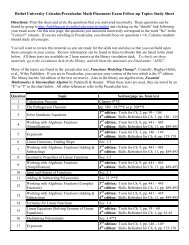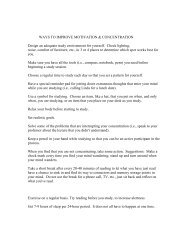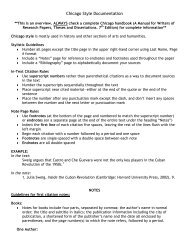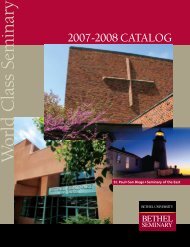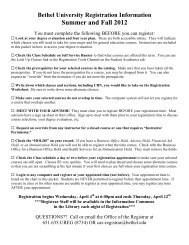here - College of Arts & Sciences - Bethel University
here - College of Arts & Sciences - Bethel University
here - College of Arts & Sciences - Bethel University
Create successful ePaper yourself
Turn your PDF publications into a flip-book with our unique Google optimized e-Paper software.
I am NOT tabula rasa. I'm a critical scholar and pedagogue and that pr<strong>of</strong>essional<br />
approach influences my critique <strong>of</strong> the round. If this concerns you and you can't adapt,<br />
strike me. See more below.<br />
Relative importance <strong>of</strong> presentation/communication skills to the critic in decision-making<br />
:<br />
Fast is usually fine; be clear, organized, and structured. Smart and clean issue selection in<br />
rebuttals is worth many speaker points.<br />
I'm finding that I'm repulsed more and more by arrogance, and my facial expressions in a<br />
round will tell you when that's the case. (My former coaches would find this ironic given<br />
my own approach as a competitor.) You don't have to be "nice," but you should avoid<br />
bashing your opponents over the head with ad homs, with critical theory that they clearly<br />
aren't understanding (e.g., by interrupting a speaker with unnecessary PoIs), or with<br />
unnecessary speed. This is especially true if your advocacy is ostensibly "educational"<br />
and/or "transformative" (i.e., critical). Arrogance in the "service" <strong>of</strong> education is<br />
extremely unhealthy, in my view. As importantly, arrogance and a healthy critical project<br />
(that moves toward social justice) are mutually exclusive. An arrogant critical advocate<br />
simply inverts and discursively reproduces the oppressor/oppressed dichotomy in a<br />
debate round, which is, <strong>of</strong> course, bad. If you disagree and/or can't adapt, strike me.<br />
Relative importance <strong>of</strong> on-case argumentation to the critic in decision-making:<br />
Depends on the round and the other arguments on the flow.<br />
Openness to critical/performative styles <strong>of</strong> debating:<br />
Critiques (Ks): I consider WHAT is argued FROM my position as a critic. That means<br />
argue what you want; I won't intervene (that is, make arguments for the other side or<br />
dismiss an argument out <strong>of</strong> hand). At the same time, I'm not tabula rasa--I'm not<br />
evaluating your arguments from some mythical view from no-w<strong>here</strong><br />
(objectivity). As a critic, I evaluate arguments from a particular perspective, and my<br />
perspective (or critical orientation, in McGee's sense) is informed by my work in<br />
philosophy <strong>of</strong> communication, critical theory, and cultural criticism (for your purposes,<br />
poststructural, queer, and postcolonial).<br />
I also take critical advocacy (and "the" critical project) very seriously, and self-reflexivity<br />
(think Spivak’s and Bhabha’s contributions) ought to be a part <strong>of</strong> that advocacy, in my<br />
view. Without it, your advocacy simply reproduces the "invisibility" <strong>of</strong> the positivist<br />
scholar and the consequent harms in a debate round. You should also understand that I<br />
am not a note-taking mechanism in the back <strong>of</strong> the room: I expect to be moved, at both an<br />
65








